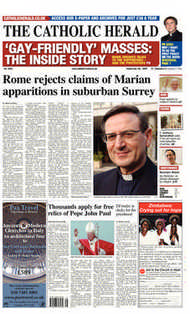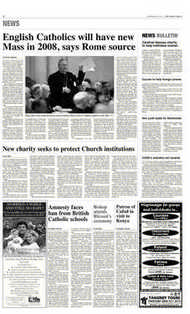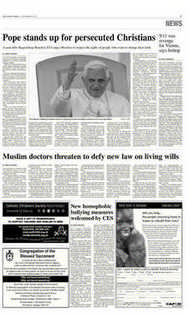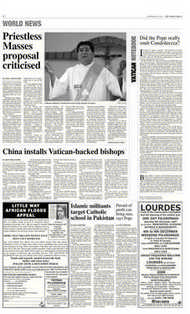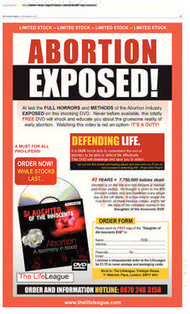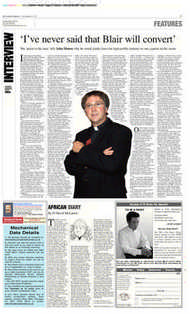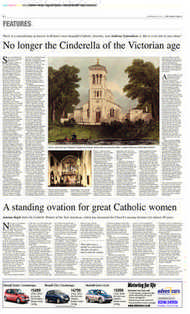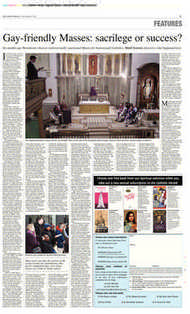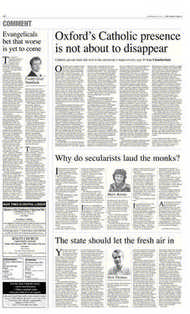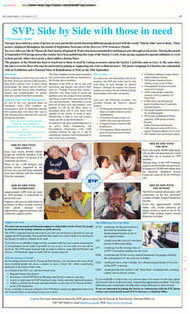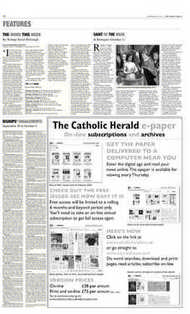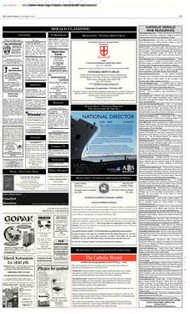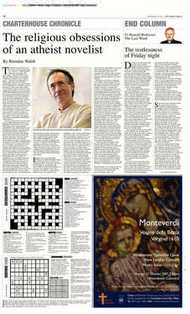Page 4, 28th September 2007
Page 4

Report an error
Noticed an error on this page?If you've noticed an error in this article please click here to report it.
Tags
Share
Related articles
Rome Denounces Lay People Saying Mass
Englishman Could Lead Dominicans
Perfect Preachers For The Next Millennium
The Return Of The Tonsure, Wimple And Soutane
A Europe Defrocked
Rockwell College Centenary
Priestless Masses proposal criticised
BY CAROL GLATZ IN ROME
THE GENERAL curia of the Dominicans has expressed surprise over a booklet published by its order in the Netherlands recommending that lay people be allowed to celebrate Mass when no ordained priests are available.
The Dominicans’ Romebased leaders said in a statement that, while they “laud the concern of our brothers” over the shortage of priests, they did not believe “the solutions that they have proposed are beneficial to the Church nor in harmony with its tradition”.
They acknowledged the Dutch Dominicans’ concerns about the shortage of vocations to the priesthood and the difficulty in offering the faithful in the Netherlands a wider celebration of the Eucharist.
But while the statement said Dominican leaders shared those same concerns it said they did “not believe that the method they [Dutch Dominicans] have used in disseminating” a booklet to all 1,300 parishes in the Netherlands was an appropriate way to discuss the issue.
An open dialogue about the availability of the Eucharist and the priestly ministry should be carried out through a “careful theological and pastoral reflection with the wider Church and the Dominican order”, they said. “The booklet published by our Dutch brothers was a surprise to the general curia of the Dominican order.” In late August the Dominicans in the Netherlands distributed a 38-page booklet, Church and Ministry, which proposed that parishes in need of an ordained priest choose their own person to become the Mass presider. The parish could then present such candidates – “women or men, homo or heterosexual, married or single” – to the local bishop to ask that they be ordained, according to the booklet.
However, basing its recommendation on practices within the early Church, the booklet said if the bishop chooses not to ordain the candidate — for example, because the person cannot meet the requirements of celibacy — then the elected candidate and the congregation could still feel assured that when they come together to “share bread and wine in prayer”, they are still receiving a real and valid Eucharist, the Dutch Dominicans’ website said.
“What is important is an infectious attitude of faith,” the booklet said.
One of the booklet’s authors, theologian and Dominican Fr Andre Lascaris, confirmed that the order was suggesting the elected leader would be cele brating a Mass and consecrating bread and wine for parishioners.
The “magical moment” of transubstantiation when Christ becomes present in the sacrament can also occur when people come together prayerfully, since the priest’s words of the consecration “are missing in the oldest prayers” of the early Church, he said.
Because of the priest shortage in the Netherlands, local Church officials advise Catholics to drive to a nearby parish that has a priest, and some parishes have a Liturgy of the Word and a Communion service with pre-consecrated Hosts.
But Fr Lascaris said a Eucharistic service with preconsecrated Hosts is like receiving “bread and wine from someone else’s table”.
He said to imagine going to a restaurant, “and you sit down and they bring you food from another restaurant” from a city far away.
Parishioners also want to celebrate together with a presider from their own community since a leader or priest is a member and “a servant of the community”, he said, adding that Mass should not be “a method of power; we see it as a method of celebrating”. The Dutch Dominicans emphasised that their proposals were meant for emergency situations when no local priest was available and a bishop refused to ordain a selected member of the community.
Dominican Fr Harrie Salemans, another of the booklet’s authors, said: “The Church is organised around priests and finds the priesthood more important than local faith communities.” Fr Lascaris said he did not think publishing and distributing the booklet was inappropriate.
blog comments powered by Disqus


